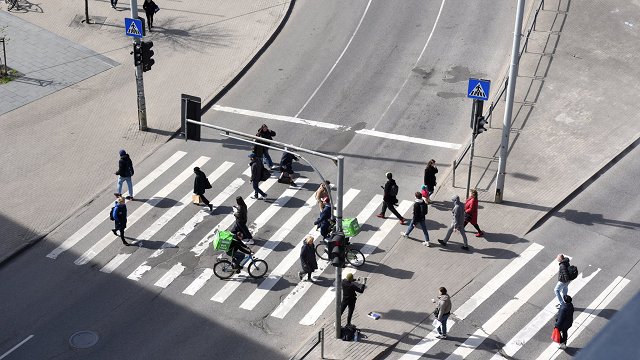Part 1 of the story series is available here and part 2 is available here.
In the final part of the series, LSM's Jolanta Plauka spoke to Economics Minister Ilze Indriksone about the matter.
Jolanta Plauka: Is it necessary to open Latvia's labor market even more to third-country workforce?
Ilze Indriksone: We are primarily focusing on boosting productivity in companies and reduce red tape in public administration to ensure a fast 'green corridor' to ensure workforce in exporting companies. But we have a lot of unused resources. In Latvia, 27% people of working age are economically inactive. It is a huge indicator. Unemployment is as if low – 5 to 6%, but it is only the registered unemployment. [..]
Regarding foreign workforce, we are currently looking not at the opening of the market but at short-term problem solution. While companies, especially the big exporting companies, cannot boost their productivity due to lack of workforce, we have to let them get the employees faster and easier – with less bureaucracy and bigger responsibility on the employer or business.
At the same time it is important to improve security, control, and data accessibility issues because those are in a bad place. In fact, we don't really know how many such people there are in Latvia. We know how many have taken work visas and temporary residence permits, but what happens to them afterwards?
We don't have such data. [..] We have a lot of work to tidy up the system but at the same time we have to allow entrepreneurs to attach workforce quickly. We have to develop a list of priority companies and not put everyone in the same basket.
You're saying similar things as the Latvian Employers' Confederation (LDDK) which also wants less bureaucracy and relaxed conditions to bring in workforce. [..] What conditions exactly could be eased?
It is a question on authorities' capacity and understanding and how precise are the documents handed in. [..] Education documents are often faked, they can't really be checked, there is no point in them. Instead of these, a report from the employer on the suitability of the worker could be submitted [..] of course exempting highly specific professions like medicine.
The other condition would be the average pay, because there are industries where average pay differs greatly from that of the country. [..] In the short term, in construction and production, we could apply the industry average pay [instead of the country's average]. Other industries are subject to discussion.
What does a green corridor mean – a list of businesses whose requests will be viewed as priority?
[..] The green corridor should have businesses from the 'good list' of the State Revenue Service (VID) and big exporting businesses – not too many, around a thousand, but not all are in the 'good' list of VID. Our slogan currently is 'all decisions within three days'. If all is submitted and no extra documents are needed, there should be a permit within three days. It's doable.
How can we do it knowing the limited capacity of the Office for Citizenship and Migration Affairs (PMLP)?
By automatizing and prioritizing. [..] It could be one branch of PMLP, maybe one branch in each region, specializing in these issues. It would be more productive because these people would know what to do. If they are working with other documents during the day, it is harder, it takes more time.
When is it planned to move these proposals in specific laws?
[..] Until August 10, heads of authorities are continuing to discuss these issues. These will continue in the next Human Capital Development Council and then the new Cabinet committee. [..] There are issues we can solve at the level of the Cabinet, by amending rules. This is a simpler process and if we agree in August the amendments could come in September. But some issues are laid down in the law and that is more complex. [..]
Currently it is important to agree on solutions to reduce bureaucracy and increase the security aspect. If we cannot agree on such solutions we cannot diminish the conditions for bringing in the workforce. These will be discussions with the Interior Ministry, State Labor Inspectorate, PMLP and VID.





























